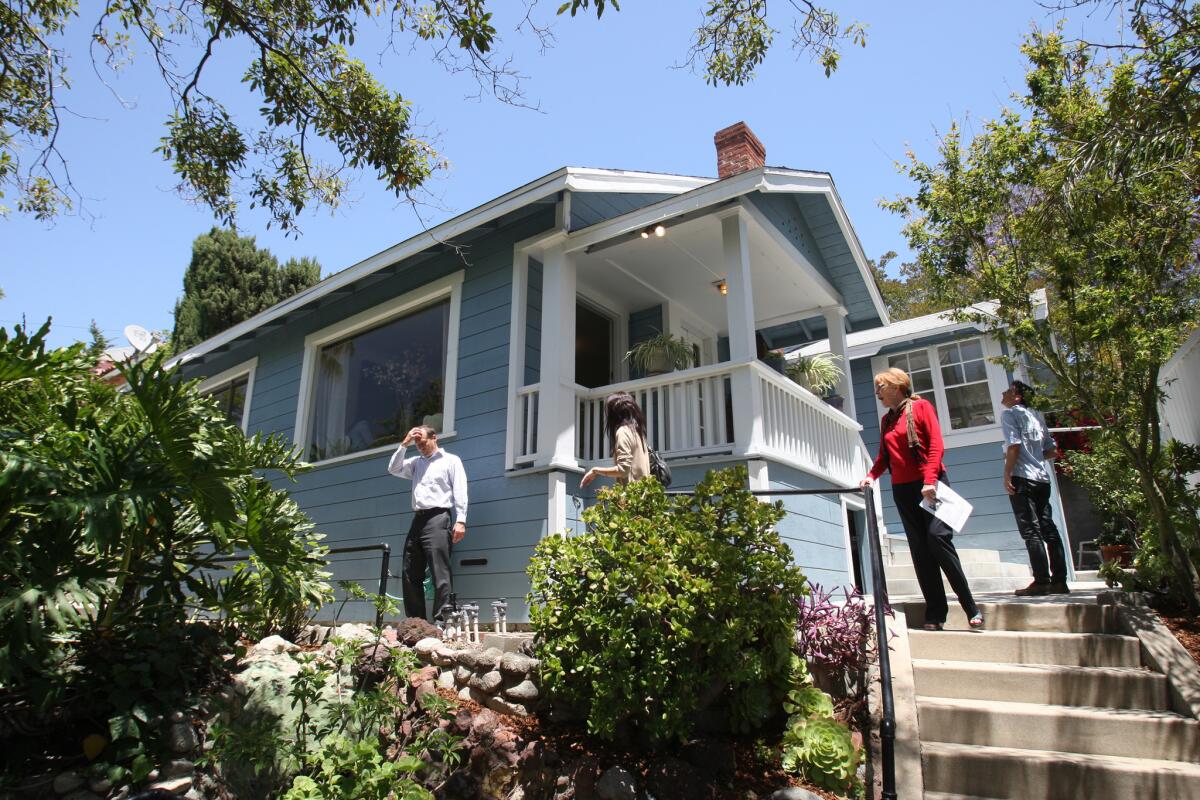For millennial home buyers, only Honolulu is pricier than Southern California

Potential buyers tour a house in Highland Park in 2012. A new study finds that the typical millennial buyer can afford just 26% of listings on the market in metro Los Angeles.
- Share via
If you’re a 20- or early 30-something and want to buy a house in Southern California, well, good luck.
Barely 1 in 4 homes on the market in Los Angeles and Orange counties is affordable to the typical millennial household, according to a new study from real estate website Zillow. Among the 96 largest housing markets in the U.S., only Honolulu had a lower share.
Zillow came up with the number by crunching a trove of listings and income data for households headed by people ages 23 to 34. It calculated monthly payments on those listings and estimated how many the median-earning millennial household could afford — defined as spending 30% of income or less. Nationwide, it found millennials could afford 70% of listings. In L.A., it was just 26%.
There are two main reasons that number is so low in the Southland, said Skylar Olsen, a senior economist at Zillow: high home prices and relatively low incomes.
“L.A. is just one of those areas where income growth has not been very strong and yet housing price growth has been fast,” she said. “L.A. almost always comes in at the top of the list for un-affordability.”
In this case, the Southland fared worse even than several pricier markets, such as San Francisco. That’s in part because incomes are lower in Southern California, but also because there’s less diversity in housing stock, with fewer lower-cost options. Inventory is tight, she said, and most new construction is geared to the high end of the market.
This poses a big challenge for the region’s economy, said Christopher Thornberg, founding partner of Beacon Economics in Santa Monica. If young people can’t afford to buy a house in Southern California, some will leave the area, he said, especially middle-class and working-class families.
“You end up with a situation where you lose the worker of tomorrow,” Thornberg said.
That’s something Adam Britten is already wrestling with. A 25-year-old with a “good job” as a marketing strategist, he’d like to buy a house someday but is not sure if he’ll be able to do it in Southern California.
Friends in cheaper markets have houses “with yards!” Britten said, and they’re building wealth. When he’s looked at houses in the Southland, he said, he just gets depressed.
“It’s not a realistic goal at this point in my life,” he said.
Down the road, Britten said, he’ll stay in Southern California if he can land a job that pays enough to buy a house. But if he can’t, he said, he may well move on.
“I would look into relocating to a place where the cost of living is more closely aligned with the average salary for my profession,” he said.
Those places do exist.
Zillow found that 70% of homes nationwide are affordable at the median millennial income in those respective markets. In regions such as Pittsburgh, St. Louis and Buffalo, N.Y., the figure tops 80%. Closer to home, 53% of listings in the Inland Empire are affordable, twice the share in coastal Los Angeles and Orange counties.
But buying a house far to the east comes with trade-offs, Olsen notes, trade-offs that young buyers may not find appealing.
“You pay more in transportation costs, gas and time,” she said. “Time is valuable. That’s time you could spend relaxing, or earning money.”
The house-versus-commute challenge is something Gilbert Arteaga has been trying to navigate for months. The 36-year-old and his wife have been trying to buy a three-bedroom house around Azusa, where their two young daughters are in school. But with a budget of about $360,000, they’re not finding many options, and they’ve been outbid a few times now.
Arteaga doesn’t want to move east and extend his already-lengthy commute to work in Glendale, and houses out there aren’t that much cheaper anyway, he notes. For now, his family is living with his wife’s parents, and they’ll keep doing that as long as it takes. But they’d like a place of their own.
“We’re trying to stay patient. Hopefully we find the right house,” he said. “We’ll just keep looking.”
Keep an eye on housing and real estate in Southern California. Follow me on Twitter at @bytimlogan
More to Read
Sign up for Essential California
The most important California stories and recommendations in your inbox every morning.
You may occasionally receive promotional content from the Los Angeles Times.






